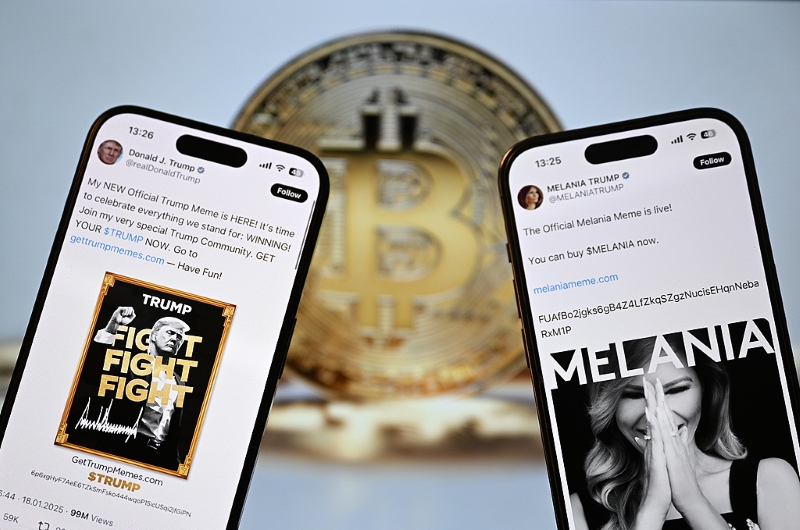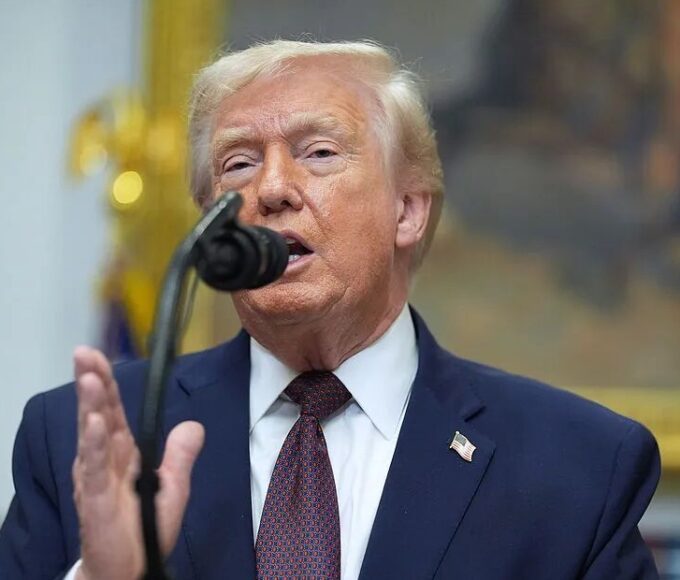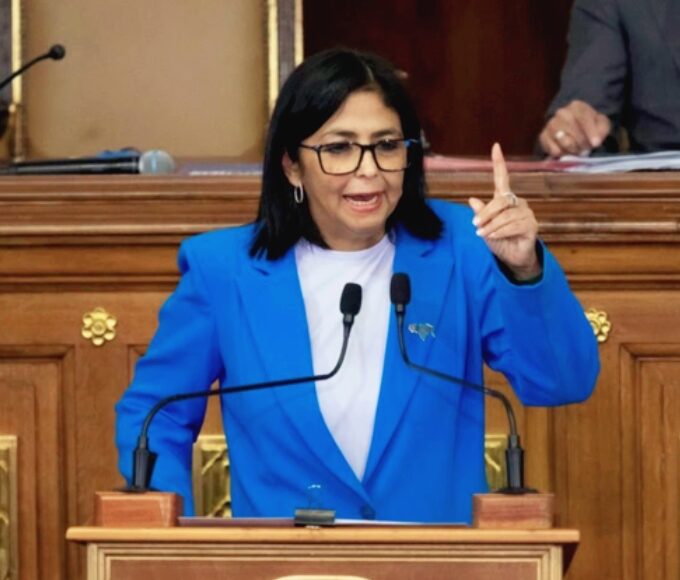The 2024 U.S. presidential election has placed cryptocurrency at the center of political and economic debates, with Donald Trump’s issuance of his own meme coin before taking office further fueling global attention on this financial asset. Since the launch of Bitcoin in 2009, cryptocurrency has grown into a multi-trillion-dollar industry, but it has also remained a topic of controversy and concern. Trump recently announced plans to create a “National Strategic Bitcoin Reserve,” modeled after the Strategic Petroleum Reserve. Some analysts believe that cryptocurrency could become a key element of economic policy in Trump’s potential second term. The potential impact of these policies on U.S. dollar hegemony and the global economic order has become a widely discussed topic in media and think tanks.
Investors in ‘Trump Coin’ Lost $2 Billion
“$2 billion in total losses!” On February 9, The New York Times published an assessment commissioned from the blockchain analytics firm Chainalysis, revealing that more than 813,000 investors suffered significant losses after purchasing Trump’s personal meme coin, “Trump Coin.” Meanwhile, the Trump Organization and its partners reportedly earned $100 million in transaction fees. When “Trump Coin” first launched on January 17, it was priced at $0.18 per coin. It later surged to nearly $75, but has since plummeted to around $16 in recent trading.
Trump’s wife has also launched her own personal meme coin. According to The Wall Street Journal and other media outlets, meme coins are cryptocurrencies created based on internet memes, viral images, or jokes. They are often associated with animals or celebrities and typically have no inherent economic utility—their value is largely driven by internet popularity. Trump’s meme coin features an image of him raising his fist, with the background displaying the words “Fight, Fight, Fight”—a phrase he uttered after being shot in the right ear at a Pennsylvania rally last summer. The most famous meme coin is Dogecoin, launched in 2013, which gained significant traction thanks to Elon Musk’s endorsement. It has since been accepted by companies like Microsoft and Tesla.
The launch of “Trump Coin” has sparked widespread attention—not just due to concerns over conflicts of interest, but also because Trump’s administration’s cryptocurrency policies could impact both domestic and global financial markets. So, what exactly is cryptocurrency? According to the Council on Foreign Relations (CFR), cryptocurrencies are named for their use of encryption technology to create digital currencies. They are typically traded between users with virtual wallets and on decentralized computer networks. Transactions are publicly recorded on a distributed, tamper-resistant ledger known as blockchain. This open-source framework prevents cryptocurrencies from being duplicated and eliminates the need for centralized institutions like banks to validate transactions.
Bitcoin is the earliest and most well-known cryptocurrency, first conceptualized in 2008 by an anonymous software engineer under the pseudonym “Satoshi Nakamoto”. It was officially launched in 2009, initially valued at just a few cents, but recently surged past $100,000 at its peak. According to The Independent, Bitcoin has now become the seventh most valuable asset in the world, with a market capitalization nearing $2 trillion. It has also led to the creation of over 10,000 other cryptocurrencies and an entire industry consisting of crypto exchanges, digital wallets, and trading applications.
The process of acquiring new cryptocurrencies is called “mining,” which involves using computers (“mining rigs”) to solve complex mathematical problems. The more powerful and numerous the mining rigs, the higher the efficiency and the greater the amount of cryptocurrency earned. As a result, large-scale crypto mining farms consume massive amounts of electricity to power and cool their mining machines.
“Bitcoin emerged in the wake of the 2008 global financial crisis,” stated the Brookings Institution on its website. At the time, public trust in banks and governments was shaken, and Bitcoin’s decentralized nature perfectly aligned with this demand. Xiang Ligang, chairman of the Zhongguancun Information Consumption Alliance, told that there were two key factors behind Bitcoin’s emergence. First, technological advancements, such as the development of blockchain technology. Second, 2009 coincided with the ongoing financial crisis. “The emergence of Bitcoin was an attempt by some to use financial means to exploit others or even entire nations. Bitcoin itself does not create any value, nor is it a valuable payment method. However, those who first mastered the technology could drive up Bitcoin’s price through speculation, putting themselves in an advantageous position,” Xiang said.
“Widespread Use Could Disrupt the Global Financial Order”
According to the website of the Center for International Relations and Sustainable Development (CIRSD) in Serbia, the core characteristics of cryptocurrencies are decentralization and anonymity, allowing transactions to bypass traditional financial institutions. An article published on the Council on Foreign Relations (CFR) website noted that because of these characteristics, many Americans see cryptocurrency as a “democratizing force”—one that can take the power of currency creation and control away from central banks and Wall Street. A scholar from the London School of Economics (LSE) also wrote that Bitcoin, as a store of wealth outside government and banking control, is particularly appealing to people living in countries with political instability, high currency volatility, or weak banking systems.
However, critics argue that cryptocurrency fuels crime and exacerbates social inequality. In recent years, cybercriminals have increasingly attacked institutional computer networks and then extorted cryptocurrency payments in exchange for restoring access. According to the U.S. Drug Enforcement Administration (DEA), drug cartels and money launderers have also begun incorporating cryptocurrencies into their operations. The U.S. and several European government agencies have shut down so-called “dark web markets”, where anonymous users trade drugs and other illegal goods and services using cryptocurrency.
According to The Independent, investors regard Bitcoin and other cryptocurrencies as “digital gold” due to their limited supply and long-term appreciation potential. In December 2023, BlackRock, the world’s largest asset management company, recommended that investors allocate around 2% of their portfolio to Bitcoin.
At the same time, the volatility of cryptocurrencies has raised concerns. In 2022, extreme price fluctuations caused the value of several well-known cryptocurrencies to plummet, leading to bankruptcies for many individuals and companies—including FTX, which was then the world’s third-largest cryptocurrency exchange. The collapse of FTX and other firms resulted in tens of billions of dollars in investor losses, prompting some experts to call for a complete ban on cryptocurrencies. Xiang Ligang stated that if a country widely adopts cryptocurrencies, there would be no entity capable of controlling the situation or taking responsibility in the event of a collapse, significant depreciation, or technical failure. This could lead not only to financial crises but also to economic turmoil and even major political issues. From this perspective, widespread cryptocurrency adoption could disrupt the global financial order and pose significant challenges to human development. Others have pointed out that if cryptocurrencies become the primary global payment method, they could undermine the ability of central banks—especially those of smaller nations—to implement monetary policy by controlling the money supply.
Bitcoin and other cryptocurrencies’ “mining” process is extremely energy-intensive, raising concerns about their impact on climate change.
The Singapore-based cryptocurrency payment company Triple-A estimates that as of 2024, more than 560 million people worldwide own cryptocurrency. A Pew Research Center survey conducted in February 2023 found that 17% of U.S. adults had invested in, traded, or used cryptocurrency at some point. This percentage has remained statistically unchanged since 2021. Additionally, 63% of American respondents expressed little to no confidence in the reliability and security of current cryptocurrency investment, trading, or usage methods. Only 5% of U.S. adults reported feeling confident or very confident about cryptocurrency, while 18% had some confidence.
In 2021, El Salvador became the first country to adopt Bitcoin as legal tender, allowing residents to pay taxes and settle debts with it. However, according to a poll by José Simeón Cañas Central American University, by 2024, about 92% of Salvadorans had not used Bitcoin. Furthermore, according to an AFP report on January 30, El Salvador modified its Bitcoin-related laws to secure a loan from the International Monetary Fund (IMF). As a result, businesses are no longer required to accept Bitcoin as payment, and government agencies will have limited involvement in Bitcoin-related activities.
“Developing countries should take a cautious approach when adopting cryptocurrencies,” the United Nations Conference on Trade and Development (UNCTAD) warned in August 2022. While private digital currencies have provided economic benefits for some and facilitated remittance flows, they remain highly volatile financial assets that pose social risks and economic costs. As of January 2024, 130 countries are actively considering launching their own central bank digital currencies (CBDCs) in response to the rapid growth of cryptocurrencies.
Strengthening or Undermining U.S. Dollar Hegemony?
Over the past year, both the Democratic Party and Donald Trump have shifted their stance on cryptocurrency. According to Politico and other media outlets, many Democrats previously opposed the cryptocurrency industry. However, in May 2023, a pro-crypto bill unexpectedly gained bipartisan support in Congress, with backing from prominent Democrats, including Nancy Pelosi.
In 2019, Trump explicitly stated that he disliked Bitcoin and other cryptocurrencies, arguing that “unregulated crypto fuels illegal activities such as drug trafficking and other crimes.” However, during his 2024 presidential campaign, Trump became the first major-party presidential candidate to accept donations from the cryptocurrency industry.
According to Reuters and other media latest reports, in July 2023, while attending a Bitcoin conference in Tennessee, Trump pledged to “ensure that the United States becomes the global capital of cryptocurrency and the world’s Bitcoin superpower.” He also announced plans to establish a “National Strategic Bitcoin Reserve” and predicted that Bitcoin’s market value could surpass that of gold. Just three days after taking office, Trump ordered the creation of a Digital Assets Task Force, one of whose primary objectives is to explore the U.S. cryptocurrency reserve. He has instructed the task force to submit a report by July outlining standards for such a reserve. Some speculate that the U.S. government may use previously seized Bitcoin to establish this reserve. According to Quartz and other financial media, 16 U.S. states have already expressed interest in Bitcoin reserve strategies, with Utah potentially becoming the first state to implement such a plan. Relevant legislation is currently under consideration.
Republican Senator Cynthia Lummis from Wyoming has proposed a more detailed Bitcoin reserve plan. In July 2023, she introduced a bill that envisions the U.S. Treasury using profits from Federal Reserve bank deposits and gold reserves to purchase 200,000 Bitcoin annually for five years, accumulating a total of 1 million Bitcoin. This would represent approximately 5% of Bitcoin’s total global supply of 21 million coins. Some Bitcoin advocates view cryptocurrencies as a hedge against inflation, as Bitcoin has a permanently fixed supply, unlike fiat currencies, which central banks can print indefinitely. By holding Bitcoin reserves, the U.S. could reduce its deficit without raising taxes, thereby strengthening the dollar. In November 2023, Lummis told Fox Business that her plan could cut U.S. national debt in half within 20 years.
Some argue that cryptocurrencies can reinforce U.S. dollar hegemony by weakening weaker sovereign currencies. According to Politico and other media outlets, providing stablecoins—cryptocurrencies “pegged” to a fiat currency to maintain value stability—to countries and regions struggling with high inflation and a strong demand for U.S. dollars could further strengthen the dollar’s dominance. Some members of the crypto industry claim that issuing stablecoins aligns with U.S. foreign policy interests and represents a flexible use of American soft power.
However, others believe that the rise of cryptocurrencies could further undermine the dominance of the U.S. dollar. Some analysts suggest that if Bitcoin gains widespread acceptance as a global reserve currency, it could erode the dollar’s status as the world’s primary reserve currency. Additionally, cryptocurrencies can circumvent traditional U.S. financial sanctions, which would also weaken dollar hegemony.
According to The Conversation Australia, cryptocurrency may become a core element of Trump’s economic policy in his second term. His proposal to create a “National Strategic Bitcoin Reserve” has sparked widespread debate, not just over its feasibility, but also over its potential long-term impact on the global economic order. Trump’s prioritization of cryptocurrency signals a shift in power—from nation-states to crypto-holding corporations, cryptocurrency exchanges, and crypto-backed exchange-traded funds (ETFs). If the U.S. or other major economies become significant holders of Bitcoin or other leading cryptocurrencies, it could trigger a global cryptocurrency “arms race.” Reports suggest that some countries are already stockpiling Bitcoin in preparation for a possible U.S. announcement of its “National Strategic Bitcoin Reserve.” These trends could reshape the global economic order by integrating private currencies and crypto-related infrastructure into a financial system traditionally dominated by national governments and sovereign currencies.













Leave a comment